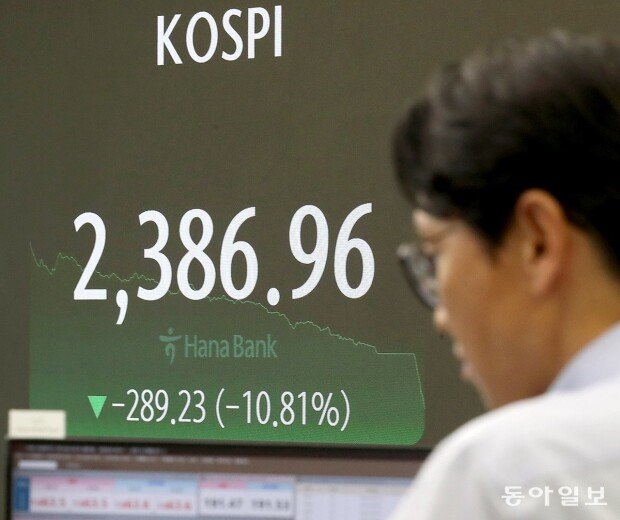KOSPI plummets below 2,400 points due to recession fear
KOSPI plummets below 2,400 points due to recession fear
Posted August. 06, 2024 07:46,
Updated August. 06, 2024 07:46

A historical dumping by investors concerned about the economic downturn in the U.S. caused historic drops in the stock markets of South Korea, Japan, and Taiwan, devastating the Asian stock market. It is unprecedented that the fear among investors alone caused such a huge drop in the market without a series of bankruptcies or the outbreak of infectious disease, which demonstrates how vulnerable the South Korean financial market is to changes in the external environment.
KOSPI closed at 2,441.55 points on Monday, which is 234.64 points lower than the previous trading day. It is the largest drop in the index’s history. KOSDAQ also decreased by 88.05 points, closing at 691.28 points. With such large decreases in KOSPI and KOSDAQ, a circuit breaker was triggered, suspending trading for 20 minutes on Monday afternoon. The last time a circuit breaker was implemented in both KOSPI and KOSDAQ was March 19, 2020. With a further drop in KOSPI after trading was resumed, the index fell by as much as 282.23 points, reaching 2,386.96 points at one point.
The direct cause of the crash on Monday was concerns about an economic downturn in the U.S. Anxiety about a potential slowdown in the U.S. is growing as the country’s manufacturing indexes worsened and its unemployment rate recorded a 3-year high last weekend. Furthermore, doubts about big tech companies’ performance, which has been leading the stock market, spread as suspicions about artificial intelligence-related bubbles were raised, further decreasing the stock market. In the case of Japan, the sharp rebound of the yen’s value with an increase in the base rate has caused concerns about export companies and a sudden outflow of the yen carry trade, which involves borrowing cheaply in yen and investing other assets across the world, aggravating anxiety in the market.
However, stock experts say that such factors are limited in explaining such huge stock market crashes. Instead, such large drops without clear causes, such as the global financial crisis, the September 11 attacks, or the COVID-19 pandemic, result from the vague sense of fear quickly spreading among investors, leading to the repetition of irrational dumping. “There isn’t a clear factor that can explain the market crash,” said Kim Hak-gyun, the head of the research center of Shingyoung Securities. “It might be a reaction to an excessive increase in the U.S. stock market. However, it feels rather disappointing that the South Korean stock market, which hadn’t gone up that much, experienced even a bigger crash.”
Jae-Dong Yu jarrett@donga.com







